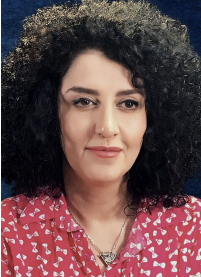On this date in 1972, Nobel laureate and human rights activist Narges Safie Mohammadi was born to middle-class parents in Zanjan, Iran, a city of about 400,000 that has a history of left-leaning politics. Her father was a cook and farmer. Her mother’s family was political, and after the Islamic revolution in 1979 toppled the monarchy, an activist uncle and two cousins were arrested.
In awarding her its 2023 Peace Prize while she was imprisoned in Tehran, the Nobel committee cited Mohammadi’s “fight against the oppression of women in Iran and her fight to promote human rights and freedom for all.” She is only the 19th woman to win the 122-year-old prize. “I will continue to fight against the relentless discrimination, tyranny, and gender-based oppression by the oppressive religious government until the liberation of women,” she said in a statement. (New York Times, Oct. 6, 2023)
She was first arrested for her political activities as a student at Imam Khomeini University in Qazvin, where she wrote articles supporting women’s rights and majored in applied physics to earn an engineering degree. In 1999 she married anti-theocrat Taghi Rahmani, who later described himself like this: “As a Muslim who supports freedom and democracy, I am opposed to a number of principles and positions of the Islamic Republic. … I belong to a movement that is known in Iran as a nationalist-religious movement. This movement believes that religion should serve civil society.”
Mohammadi worked as a journalist for several reform-minded newspapers and published a book of political essays before joining the Defenders of Human Rights Center in 2003, later becoming its vice president. She also worked as an engineer for the Iran Engineering Inspection Corp. The government forced the company to fire her in 2008.
The authorities violently disbanded the center in 2009 and Mohammadi was arrested. Her twins — a daughter named Kiana and a son Ali — were born Nov. 28, 2006. They saw their parents arrested periodically until flying in 2015 to Paris to join their father in exile, where he has been since 2012. The children have not seen their mother since they left and are no longer allowed to talk to her on the phone.
Mohammadi had vowed to stay in Iran to continue the fight. In her letter to the Prosecutor General of Tehran after the children left when they were 8, she wrote: “In my head, I started to talk to my children. … How many times will they hurt your small yet innocent hearts and watch you cry as you’re separated from your mother or father?” (Amnesty International, Aug. 4, 2015)
In 2016, while already imprisoned, she was sentenced to 16 more years for working with a human rights group to abolish the death penalty. Released in 2020, she was rearrested and sent back to prison in late 2021, where she remains as of this writing in October 2023.
“I started campaigning in Iran 32 years ago, as a student,” Mohammadi said. “My goal back then was to fight religious tyranny, which along with tradition and social customs have led to the deep repression of women in this country. That’s still my goal.” (New York Times, Sept. 16, 2023)
Her honors include the 2018 Andrei Sakharov Prize and $10,000 from the American Physical Society in recognition of her activism “despite persecution that has forced her to suspend her scientific pursuits and endure lengthy incarceration.” She was one of the recipients of the 2023 Olof Palme Prize awarded along with $100,000 for outstanding achievement in the spirit of Olof Palme.


